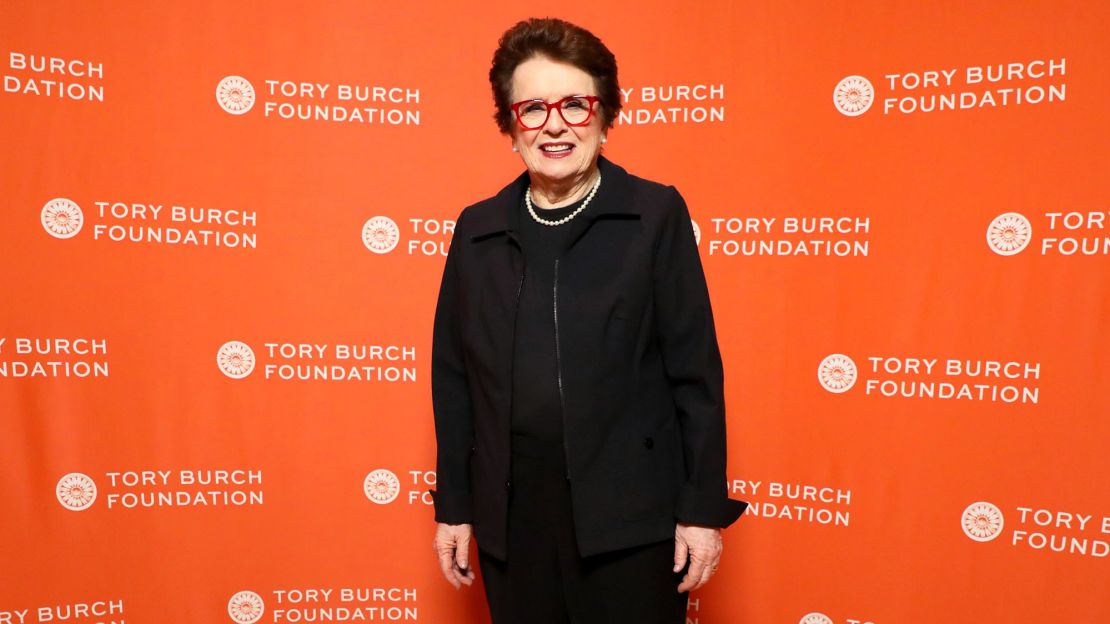Billie Jean King has urged players that are struggling with the demands of being a tennis professional to seek support from psychologists.
Two years ago, four-time grand slam champion Naomi Osaka decided not to speak to the media at the French Open, citing her mental health, before withdrawing from the tournament completely.
At this year’s tournament in Paris, Belarussian world No. 2 Aryna Sabalenka also opted out of speaking to the media after saying she “did not feel safe” at one of her media conferences when asked about the war in Ukraine.
Recently, Great Britain’s Emma Raducanu went as far as describing the tour as “completely brutal” and even admitted she sometimes wishes she had never won the US Open in 2021, the tournament that catapulted to overnight stardom.
“Being a pro-athlete is hard,” tennis great King, who won 39 major titles, told CNN’s Christiane Amanpour.
“The WTA [Women’s Tennis Association] has been fantastic with mental health for years, but people would say: ‘Why aren’t you doing anything?’

“Of course we’re doing things. We have to keep it private. This is about private issues with each player. I used to talk to Kathleen Stroia, who’s the head of health services, ad nauseum [about] what’s going to happen in the future.
“How do we make it better? How do we help with all this? We have psychologists. Believe me, since the ‘80s and ‘90s, the WTA has been on this. We have psychologists for whatever you need.”
The WTA says it provides a number of tools that players can access early on in their careers to help them adjust to life on the professional circuit.
The governing body has provided staff that are dedicated to athletes’ mental health for more than 25 years, with a Mental Health Care Provider available in person at tournaments, including all four grand slams, and there are virtual meetings available upon request in between tournaments.
The WTA also offers player development programs, such as a mentor program that brings rookies and veterans together, media training sessions, education for the players’ support teams and ‘Advantage Programs’ that offers training and guidance in areas such as business and coaching.
‘A lot of sharks’
Media conferences in particular have become a talking point when discussing the issue of players’ welfare.
At the time of her withdrawal, Osaka said she felt “people have no regard for athletes’ mental health,” something that “rings very true” when she takes part in media conferences.
Similarly, Sabalenka’s claim that she felt unsafe came after she was asked persistently about Russia’s war in Ukraine – her home country has been a springboard for Russian military operations in Ukraine.
Sabalenka has publicly condemned the war and Belarus President Aleksandr Lukashenko on a number of occasions, but said for her “own mental health and well-being” she would be pulling out of her third-round post-match press conference.

Speaking more broadly about the tour, Raducanu said there are “a lot of sharks out there,” describing it as “not a very nice, trusting and safe space.”
“What do they expect?” King said. “It is going to be difficult, but you’ve chosen to be a professional athlete. With that goes certain things that you have to look at. It’s competitive.
“You have to ask for help if you need it. We [athletes] are used to stiff upper lip, be tough. No. On the court maybe, but off the court, you need help. Ask for what you want and need. Girls are socialized not to do that.
“Have you ever noticed that girls have a hard time to ask for what they want and what they need? And they need to step up and ask for it.”
King stressed that she empathizes with players that are struggling to manage all of the responsibilities that come with being a high-profile athlete.
During the peak years of her career, King was the driving force behind the creation of first the Virginia Slims Circuit and then eventually the WTA Tour, which was formed in 1973 ahead of the start of Wimbledon.
King’s fiery temperament on the court was well known – she describes herself as “very intense” and a “hothead” – something the 79-year-old attributed to her competitive nature, but also the off-court responsibilities she had with the formation of the circuits.

“I hate losing,” she said. “We’ve got a lot of things going on off the court. I’ve got a lot of meetings when I get off the court, I’ve got to go talk to players, to sponsors, or whoever, and so I’ve got that in my head.
“But that was a privilege to have that … and I think we should always talk to the media, by the way. I think when we don’t, it’s a mistake because as a professional athlete, that’s part of the territory.”
Remarkably, King won the singles, doubles and mixed doubles at Wimbledon two weeks after founding the WTA, clearly thriving under the pressure, but says the decision to become a professional isn’t something budding players should take lightly.
“When you sit down and you ask yourself: ‘Do I want to be a pro athlete? Pro tennis player?’” she said. “This is what goes with it. Do you want to deal with it or not?
“And I know it’s tough, but I think it’s a privilege. It’s a privilege to have media, it’s a privilege to talk to you, that you even care about what I think or the WTA or tennis players.”




